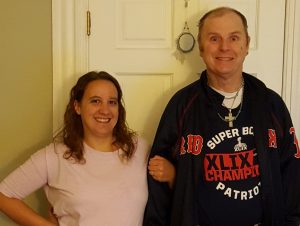Shared Family Living: Opening your Home and Heart
A few years ago Noelle Biron’s mother was diagnosed with Parkinson’s disease and receiving rehab services in a skilled nursing facility. Noelle would frequently drop to visit her mom. Soon she noticed that not every resident had someone like her in their life. “It was a little shocking to me that a lot of elderly people and people with disabilities had no one to visit or look out for them,” said Noelle.
Not long after that experience, Noelle and her husband bought a big house with more than enough room for their family. Looking at the spare bedrooms she couldn’t shake the feeling that maybe her family could make a difference for someone else. Noelle began reaching out to human services agencies. Her journey brought her to Lakes Region Community Services’ Shared Family Living (SFL) Program and eventually to the newest member of her family, Tom.
SFL connects a person with a disability with a qualified family willing to share their home. A SFL home is much more than a spare bedroom. Providers open their lives and homes to create a supportive living environment. These unique living arrangements make a huge difference by encourage independence, community involvement and enhancing the quality of life.
What makes someone a great Shared Family Living provider? “Patience and problem solving skills are important, as is being an innate nurturer,” said Director of Shared Family Living Susan Morin. She adds that the best home providers tend to be drawn in the way Noelle was – as if they are answering a calling rather than looking for a job. “The desire to be a provider and open your home has to come from your heart. It’s a big commitment and a life changing experience.”
Tom had been living with another home provider for several years, so Noelle worried the transition might be difficult for him. However, it went rather smoothly. “Because of his brain injury, Tom thought his provider was just on vacation. It took some time for him to understand that he was here permanently.”
Noelle and her husband have three children ages 17, 7 and 21 months. During the week, Tom spends his days in the community working and pursuing other activities. Noelle home schools her teenage daughter and is busy taking care of her baby and 7 year old son, who also has special needs.
“Having Tom live here has helped my son learn that everything will be OK. Tom helps both my kids understand that everybody is not the same, but we treat everyone with respect. Tom loves to play with the baby and he and my son enjoy playing cards. Everyone has adjusted very well.”
Comments, questions, and ideas for future blog posts can be sent to: Joanne Piper Lang, LRCS Director of Development and PR at joanne.lang@lrcs.org



